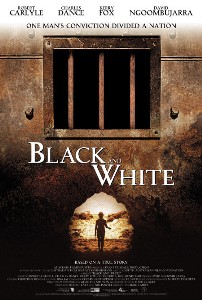Black and White (2002 film): Difference between revisions
→External links: Stub-sorting. You can help! |
|||
| Line 38: | Line 38: | ||
| accessdate=21 February 2006 |
| accessdate=21 February 2006 |
||
}}</ref> |
}}</ref> |
||
Louis Nowra said he spent two years working on the script. He said the director and producer thought Max Stuart was innocent but after visiting Ceduna Nowra came to believe he was guilty. Both points of view were shown in the final movie. Nowra was greatly disappointed with Robert Carlyle's performance which he felt was contrary to the character he had created.<ref>[http://www.aftrs.edu.au/media/books/lumina/lumina9-ch23/index.html Interview with Louis Nowra ''Lumina''] accessed 11 March 2014</ref> |
|||
==Awards== |
==Awards== |
||
Revision as of 11:45, 11 March 2014
| Black And White | |
|---|---|
 | |
| Directed by | Craig Lahiff |
| Written by | Louis Nowra |
| Produced by | Helen Leake Nik Powell |
| Starring | Robert Carlyle Charles Dance Kerry Fox David Ngoombujarra Colin Friels |
| Edited by | Lee Smith |
| Music by | Cezary Skubiszewski |
| Distributed by | New Vision Films |
Release date | 31 October 2002(Australia) |
Running time | 99 minutes |
| Country | Australia |
| Language | English |
| Box office | A$177,866 (Australia)[1] |
Black and White is a 2002 Australian film, directed by Craig Lahiff and starring Robert Carlyle, Charles Dance, Kerry Fox, David Ngoombujarra, and Colin Friels. Louis Nowra wrote the screenplay, and Helen Leake and Nik Powell produced the film. The film won an Australian Film Institute award in 2003 for David Ngoombujarra as Best Actor in a Supporting Role.
Plot
Based on real events, it tells the story of Max Stuart (Ngoombujarra), a young aboriginal man who was sentenced to death after being found guilty of the murder of a nine year old girl on what was considered questionable evidence. It follows the fight by his lawyers David O'Sullivan (Carlyle) and Helen Devaney (Fox) to save Stuart from execution, as well as Crown Prosecutor, Roderic Chamberlain's (Dance) efforts to convict Stuart. Rohan Rivett editor of an Adelaide paper, The News, and its publisher, Rupert Murdoch (Ben Mendelsohn) also feature as leading the public response in the campaign to save Stuart.
In the final scene of the film, Max Stuart appeared as himself as an older man, driving along a dirt highway near Alice Springs where he now lives, and saying: "Yeah, some people think I'm guilty and some people think I'm not. Some people think Elvis is still alive, but most of us think he's dead and gone."[2]
Production notes
The film's producer, Helen Leak has reported that Stuart's response to seeing the film was, "It ain't half bad, but it's a long time to wait between smokes!"[3]
Louis Nowra said he spent two years working on the script. He said the director and producer thought Max Stuart was innocent but after visiting Ceduna Nowra came to believe he was guilty. Both points of view were shown in the final movie. Nowra was greatly disappointed with Robert Carlyle's performance which he felt was contrary to the character he had created.[4]
Awards
In 2003, the film won the Australian Film Institute award for Best Actor in Supporting Role.
See also
References
- ^ "Australian Films at the Australian Box Office", Film Victoria accessed 11 November 2012
- ^ Penelope Debelle (2002). "Max Stuart reflects, finds peace". The Age. Retrieved 21 February 2006.
- ^ Ken Inglis interviewed by Terry Lane (2002). "Transcript of The National Interest: writing history". The National Interest. Australian Broadcasting Corporation Radio National. Retrieved 21 February 2006.
- ^ Interview with Louis Nowra Lumina accessed 11 March 2014
